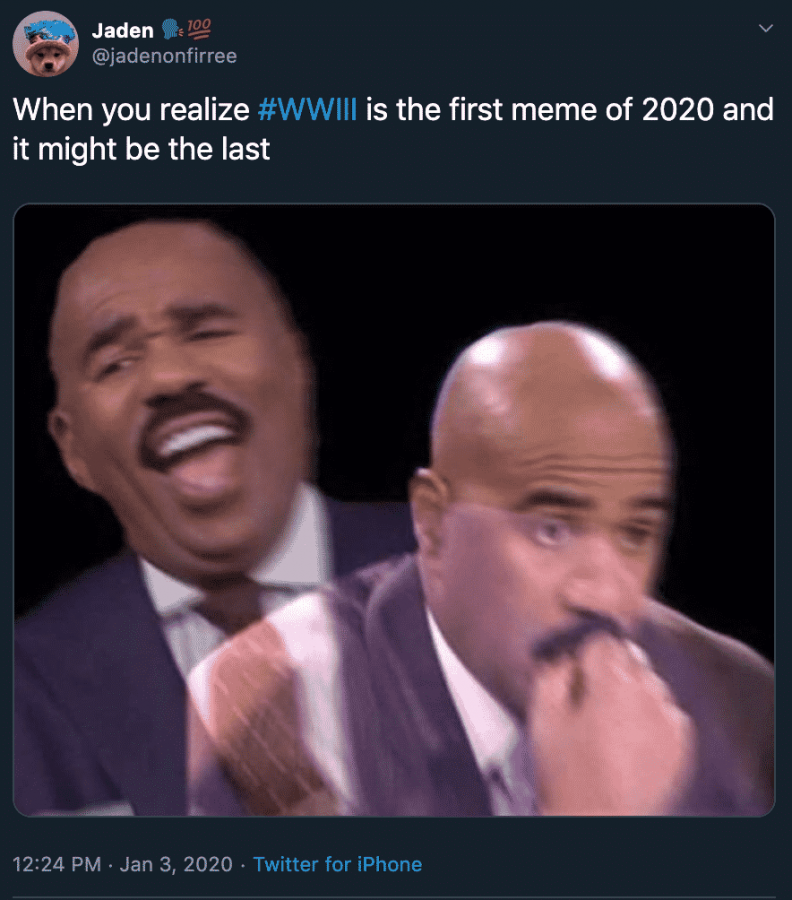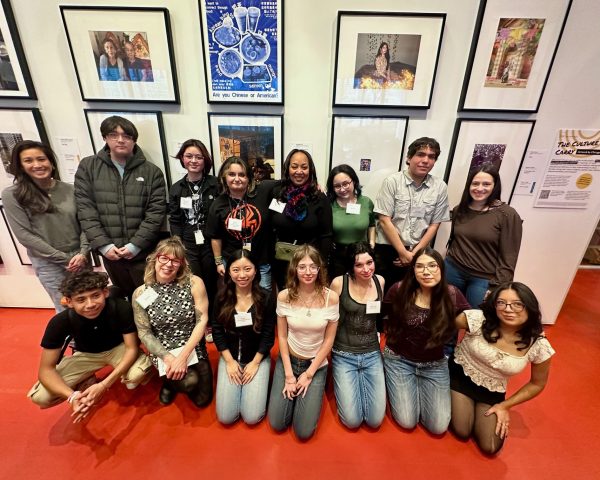The Anatomy Of A Meme
How meme culture has adapted to global conflicts and situations
Guy Ryan scrolls through Instagram to find the next image to post. Looking through the seemingly endless feed of pictures, videos and advertisements, he spots a meme making a joke about the recent Coronavirus outbreak. But instead of being instilled with a sense of dread, Ryan laughs and scrolls down to the next post.
Following the rise of social media and internet sharing platforms, memes have become a popular source of satire among teenagers.
“Any time something serious happens, it’s often turned into a meme,” Ryan, Div. 182, said.
Recently there have been multiple social media trends with memes poking fun at serious global dilemmas. For example, in early January social media users were faced with jokes and memes about the looming threat of World War 3, following the American missile strike that killed one of Iran’s military generals, according to Wired.
“Any time something serious happens, it’s oftentimes turned into a meme which puts that global issue into a new format to be shared with a different community of people,” Ryan said.
The week after the World War scare, the focus of meme sharing shifted to the record-breaking Australian bushfires responsible for burning 11 million hectares of land, according to BBC News.
Daniel Velazquez, Div. 161, has also noticed the consistent change of issue when using memes to address these subjects.
“Social media constantly is moving on from one hit topic to the next,” Velazquez said.
Akwing Dut, Div. 169, known by his classmates for sharing his own jokes on his Snapchat story, said that memes are a positive thing, helping teens stay updated on global issues.
“Teens nowadays are always on their phones, and that is a universal truth wherever you find teenagers with phones,” Dut said. “We are almost never looking at news sites when we are on our phones, and most of us do not watch the news on TV.”
In a poll given via Google Forms distributed on Snapchat by The Warrior, 84% of the 140 respondents said that the memes relieve their stress over these dark topics.
However, not everyone agrees. Thalia Kennedy, Div. 151, said that she felt the memes that joked about her generation being drafted to fight in World War 3 were inappropriate. Kennedy was not the only student with this sentiment. Kyle Jonas, Div. 377, described those memes as “ignorant” and “unfunny.”
Whether or not social media users got a laugh from the memes, the sheer number of jokes that popped up all over the internet started raising concern. Annabelle Jimenez, Div. 382, says she wasn’t surprised that World War 3 was a topic for so many memes.
“I think it’s just a result of pop culture and Gen Z’s less than stellar coping mechanisms,” Jimenez said.
Mr. Parsons, an AP Psychology teacher, said that students at Lane are using humor as a defense mechanism. And there is nothing wrong with it.
“When there is an issue that provokes a lot of anxiety, causes a lot of stress, too much for someone to deal with, people will use defense mechanisms unconsciously or consciously to defend their psyche or mind from having to deal with a really stressful event,” Parsons said.
Dut agreed with Parson’s ideas as he considers memes important when a bad situation arises on a global scale. Dut claims the memes help him to destress.
“I don’t have it as bad as I think I do, and my situation, however bad, could be a lot worse off,” Dut said. “So I should stop stressing and keep things moving.”
While memes may have the ability to reduce stress, they can also spread awareness about a global crisis. In a survey distributed via a Google Form in the Daily General Student Email, 31 of 36 respondents said social media sharing was not only responsible for raising awareness, but for informing them about current global issues.
“To be honest, I probably wouldn’t have found out about the wildfires had it not been for celebrities and friends reposting about the situation,” said Jimenez.
Parsons said memes make stressful global issues a more comfortable subject of conversation and in turn make them less stressful. Additionally, memes can help decrease the intensity of these issues.
According to Parsons, the concept of using jokes to make a serious situation easier to handle isn’t new and unique to social media; comedy has been used by people of authority in times of distress for generations.
“Probably one of the funniest presidents we’ve had was Abraham Lincoln, and he dealt with one of the most serious issues we ever had, the Civil War,” Mr. Parsons said. “Another president who was very optimistic and would make jokes frequently, FDR, during the Great Depression and during World War II. So if FDR can do it and Lincoln can do it, teenagers should.”
Your donations directly fund the Lane Tech student journalism program—covering essential costs like website hosting and technology not supported by our school or district. Your generosity empowers our student reporters to investigate, write, and publish impactful stories that matter to our school community.
This website is more than a publishing platform—it's an archive, a research tool, and a source of truth. Every dollar helps us preserve and grow this resource so future students can learn from and build on the work being done today.
Thank you for supporting the next generation of journalists at Lane Tech College Prep!

Jack Belmont is a senior beginning his second year with The Champion (formerly The Warrior). Jack loves taking photos and is co-president of Lane’s Photography...

Ella, a senior, is enjoying her third and final year with The Champion (formerly The Warrior). She continues to explore the world of literature and history...

Gisselle is a senior returning for her second and final year with The Champion (formerly The Warrior). Gisselle is part of Omega, and is passionate about...




